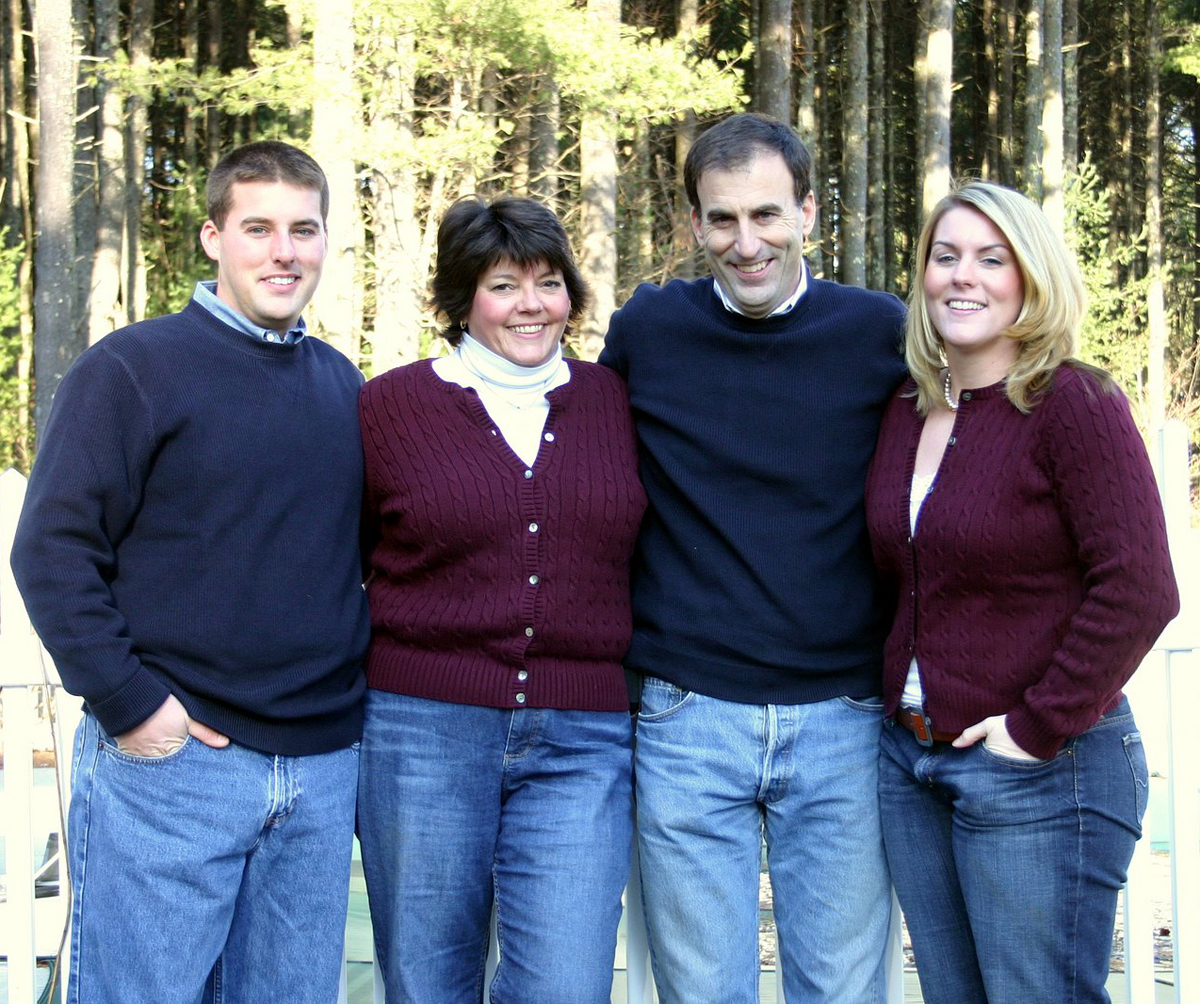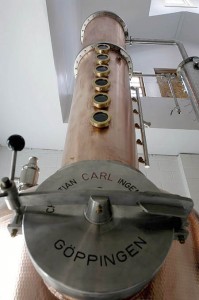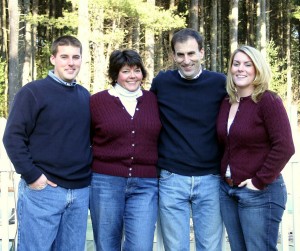
Nothing means more to the Thibodeaus than family. Their tenacious spirit shines through in both Green Thumb Farms and in Cold River Vodka. L to R: Brian, Brenda, Don and Betsy Thibodeau.
By Clayton Moore
For the Thibodeau family of Fryeburg, Maine, flying isn’t just a necessary function of their growing farm. It’s a passion shared by every member of the family. Together, Donnie and Brenda Thibodeau have not only made a success of Green Thumb Farms, their robust farming operation in rural Maine, but they’ve also made a partnership out of flying all over the country together in their Beechcraft Bonanza A36.
The couple, along with their children, is the heart and soul of their expanding 1,100-acre farm in the center of Oxford County, where they grow potatoes, beans, corn and sod. As a testament to the family’s ingenuity, their spuds have recently found a new home in an exclusive, handmade spirit. Cold River Vodka is produced exclusively by a new venture, Maine Distilleries.
“We’re true to ourselves,” says Brenda Thibodeau. “Donnie always says that your reputation precedes you, no matter where you go in life, so you’d better be sure it represents who you truly are. That’s the face you want to carry forward. We feel that way about our company, about our family, about Maine Distilleries and anything else we lay our hands on. It’s a lesson we’ve shared with our children.”
First flights
His pilot’s license says Don Thibodeau, but everybody in Fryeburg calls both Donnie and his brother Lee, a Portland neurosurgeon, “Tib.”
That’s also the name given to their esteemed father, Lawrence Thibodeau, a modest legend among the farmers of Maine, who passed away in 2004. Born in 1915 to French speaking parents, the elder “Tib” spent more than 60 years in the potato business and was elected to honorary life membership in the Potato Association of America.
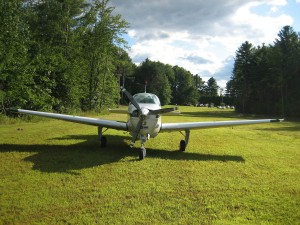
The Thibodeau family travels for business and pleasure in this Beechcraft Bonanza A36. Don, Brenda and Brian Thibodeau have private pilot licenses.
When American-grown potatoes are mentioned, many people think of Idaho, but Maine has a rich farming heritage and was once the country’s greatest producer of the crop. The Maine Farmers Exchange, Lawrence Thibodeau’s potato sales firm, based in Presque Isle, became one of the best-known and successful marketing firms in New England. With all that time in the fields, he was bound to discover another innovative invention of the time.
“My dad used to tell the story of the first crop duster that came into the county in the 1940s,” Don Thibodeau recalled. “This pilot would come by and land in the fields. My dad had ridden in the crop duster and had always wanted to fly. He did eventually solo, later in life.”
That passion for flying infected Thibodeau at a young age. Like most aspirant pilots, he made makeshift airplanes from wood lying around the farm and dreamed of the day he would pursue his youthful desire. In his teens, with his father’s encouragement, he started taking flying lessons.
“My dad told my brother and me that if we wanted to fly, he would pay for it, up to a solo,” he recalled. “That was music to our ears. We started taking lessons in Caribou, Maine, flying Cessna 150s at Jerry’s Flying Service.”
Simultaneously, he met his future wife, Brenda, at the University of Maine in Farmington. They got married in 1975.
After two years at school, he left to work for his father at the Maine Farmers Exchange. Brenda Thibodeau did a full four years, finishing up her bachelor’s degree in education before joining her husband.
The farmer’s life
Unfortunately, Thibodeau had to step back from flying when life became more complex. He was making less than $100 a week working for his father, while his wife was student teaching. They also had a child on the way. The combination of money concerns and added responsibility led him to give up flying—for a while.
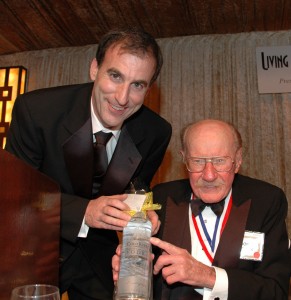
Don Thibodeau hands Bob Hoover a bottle of Cold River Vodka at the 2007 Living Legends of Aviation award ceremony. Inscribed specially for his 85th birthday, and bearing Hoover’s likeness, the bottles were handed out to lucky guests.
“We were like so many stories that you hear about—people who start flying and then have to quit because they ran out of money,” he recalled. “I say ‘we’ because if I had kept up with it, I’m sure that Brenda would have started learning to fly then, too.”
A near-accident sealed the deal.
“I almost augured a Cessna 150 into the ground while doing stalls by myself,” he remembered. “I didn’t understand that you had to use the rudder to keep that thing straight. It fell off to the side and started spinning. I released the yoke, and it came out of the dive, but it rattled me. I had a family and obligations. It was time to grow up a little bit.”
In 1977, with the financial backing and full support of Thibodeau’s father, the young couple bought a small parcel of land in Oxford County and dubbed it Green Thumb Farms. The farm’s current size is 1,100 acres, but a planned purchase of an adjoining property will soon bring the operation up to 1,800 acres.
Settled in 1762, Fryeburg was originally a strategic frontier outpost. For such a small place—less than 3,500 people call it home—it has a remarkable history that includes Indian skirmishes and revolutionary politicking. Daniel Webster taught at a local school. Another famous resident was Clarence E. Mulford, the creator of the fictional cowboy Hopalong Cassidy.
“This is the oldest farmland in the state of Maine,” he said. “Fryeburg was a king’s grant. The settlers came here for the Saco River Valley. We have the finest agricultural land in New England right here.”
Brenda Thibodeau explained that part of the reason for their land acquisition is to preserve that legacy for future generations—including their own.
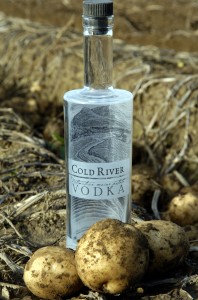
Cold River Vodka is the Thibodeau family’s latest venture. Produced exclusively by Maine Distilleries, the premium spirit is made from Green Thumb Farms potatoes.
“The farming heritage of our community has been a vital part of Fryeburg’s history,” she said. “But we’re such a playground for the people of New England that there’s a lot of development going on. For someone to buy this land and develop it commercially would be a crime.”
With 27 employees, including two of their own children, the Thibodeaus have worked hard to make the farm a success. It’s long been a learning process for the entire family.
“I think it’s like an amoeba,” Donnie Thibodeau laughed. “It just keeps growing. There’s nothing like bringing up a family on a farm. You spend a lot of time together. The kids learn a lot of things they wouldn’t learn working at McDonald’s. It’s a lifestyle that few people can afford. We feel very fortunate.”
Brian Thibodeau, their eldest son, runs the turf operation at Green Thumb Farm, while daughter Betsy works in the office alongside her mother. Their youngest son, Brett, died in a single-car accident on Sept. 23, 2005, at the age of 23. He had recently become head of sales for the farm, landing prestigious customers like Whole Foods, and was evolving into a well-respected businessman. The reflections of his friends and family portray a funny, well-liked young man who is sorely missed.
“It’s hard,” his mother said. “Every day, we still find places where he’s left his mark. He’s going to go on forever in a lot of ways. We certainly miss him and wish he were here to see the growth of the farm, because he was proud of it. But our glass is half-full, not half-empty. We have terrific memories.”
Boys will be boys
Although he had previously had frequent temptations to get back into flying, his sons led Donnie Thibodeau to rediscover the joys of flying. He joined them as they started flying in the mid-1990s.
“The problem was that we had these darned spray planes around,” he laughed. “It’s like a disease. They’ll drive you nuts; it’s almost as if they’re teasing you. There’s nothing closer to a fighter plane than a crop duster. When you see a pilot spin that plane around and drop it right into a field for you, it’s a terrible persuasion.”
His wife had always predicted he’d return to airplanes, but she didn’t think the whole family would join in. In 1996, Brian Thibodeau was accepted to the prestigious aviation program at Embry-Riddle Aeronautical University. After earning a degree in avionics, he returned to land a job at nearby Eastern Slope Regional Airport (IZG).
“I told Brenda, ‘There’s no way that kid can work out at the airport; I can’t go out there and see those planes and not fly,'” Thibodeau remembered. “She said, ‘Go for it.'”
With only a little reluctance, his wife gave her blessing, and within weeks, the family purchased an IFR-ready 1965 Cherokee with a brand new 185-horsepower motor.
“We flew the pants off that plane,” Thibodeau said. “Flying truly is our diversion. I’d maintain that I didn’t want to wait for a plane to come in if some other pilot was flying it. If I had half an hour, I’d go over and make a few landings. We try to justify it, but you really just end up rationalizing it.”
By February 1997, he had his license, and he had accumulated more than 100 hours by June. His sons earned their wings around the same time, and soon dragged their mother into their obsession.
Brenda Thibodeau’s turn
With all their conversations centered on airplanes and piloting, Brenda Thibodeau decided she’d better come up to speed.
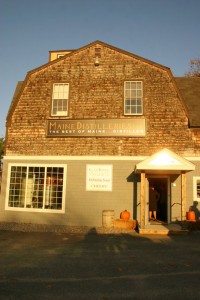
Cold River Vodka, a handmade, small-batch spirit, is distilled in Freeport, Maine, at Maine Distilleries.
“When they were getting their licenses, it was all plane talk and shop talk,” she remembered. “Betsy and I would call timeout on the airplane talk. I really started flying in self-defense.”
Their social network soon centered on others who owned planes.
“They were very interesting, fun people,” she said. “I decided that if I couldn’t beat them, I’d join them.”
Although Betsy Thibodeau happily flies with her parents, she’s resisted the temptation to get her own license. When her mother started taking lessons, her instructors found she was a quick learner. She earned her private pilot’s license in February 2001.
“It was my turn, I guess,” she said. “Once I started, I couldn’t stop.”
In April 2001, the Thibodeaus sold the Cherokee and bought a Beechcraft Bonanza A36. It’s based at Eastern Slopes Regional Airport, where Donnie Thibodeau is now a member of the airport authority.
The Bonanza was a fairly robust aircraft for Brenda Thibodeau to fly as a newly minted pilot, but she rose to the challenge.
“It was tough, but I was determined to transition into the Bonanza,” she said. “It was exciting, but I was nervous.”
She spent the entire summer working with the FBO’s owner, who took the time to make sure she was properly checked out in the aircraft.
“She was a tiger,” her proud husband recalled. “She started learning on that Bonanza with only 92 hours, which is a remarkable achievement. She’s a very good pilot. Because she’s a very detail-oriented person, she’s able to pilot a complex airplane.”
She’s since joined the Katahdin Wings, the Maine chapter of the International Organization of Women Pilots, more widely known as the Ninety-Nines. She works closely with the organization and pursues other support roles with nonprofits like Rotaplast International.
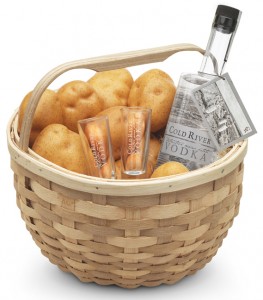
Maine Distilleries offers unique gifts, including this potato basket containing a bottle of Cold River Vodka, two vodka glasses and a pile of Green Thumb Farms gourmet potatoes—all from Maine.
“We have a great group of women in our chapter,” she said. “There’s a lot to learn from these women, especially if you’re a young pilot. I recommend other women to the Ninety-Nines, because it brings so much camaraderie.”
Her efforts have been widely recognized within the community, but her husband is her biggest fan.
“I think an airplane empowers a woman,” he said. “When my wife comes into the airport in that A36, no one’s prouder than I am. People don’t expect a lady to handle that plane. I’ve heard guys say, ‘I have an airplane, but my wife doesn’t like it.’ My wife is a pilot, and they think I’m the luckiest man in the world.”
The couple sometimes argues over who’s going to sit in the left seat. Brenda Thibodeau usually wins, to nobody’s surprise. But for the most part, they make a good team.
“If Donnie and I were going to fly together, I wanted to understand it,” she said. “It’s sometimes tricky when you’re flying as husband and wife, but it made us learn cockpit management really well. Not only are we married, but we work together and then we get to fly together.”
The Cold River spirit
Brenda Thibodeau said that her husband is the “entrepreneurial spirit.”
“I’m like the roadrunner behind him, clearing a path and trying to organize things,” she said. “He’s a real whirling dervish.”
A conversation in an airplane led to the establishment of Cold River Vodka, the family’s latest enterprise. It was inspired partially by necessity and partially by Lawrence Thibodeau’s anecdotes about Maine bootleggers making vodka from potatoes during the days of Prohibition.
Three years ago, the bottom fell out of the potato market for a time, owing to certain market conditions and the carbohydrate-hostile Atkins Diet. Donnie and Lee Thibodeau were making frequent trips in the Bonanza to visit their mother in northern Maine; during one of those treks, they contemplated doing something different with potatoes. They decided to enter a new market by turning the potatoes into high-end vodka.
The brothers added two more partners: Bob Harkins, a former ski area executive, and Chris Dowe, who had expertise in brewing beer. Together they formed Maine Distilleries in Freeport and set about the tricky business of making spirits.
Their product is a super-premium, top-shelf vodka, comparable to established brands like Grey Goose and Ketel One. Each batch of 500 bottles uses 4,000 to 5,000 pounds of Green Thumb potatoes. About five percent of the farm’s potato crop goes into the distillery; 15 pounds of those potatoes makes a single $30 bottle of Cold River Vodka. The brand takes its name from a 16-mile-long river in western Maine that feeds one of the purest aquifers in the region.
“The potatoes are raised on this farm,” Donnie Thibodeau said. “We’re all Maine people in the company, born and raised. The product is genuine potato vodka, not simply a percentage of potato vodka, like some other brands. It’s hand-distilled and handcrafted. The vodka is, in many ways, just the advancement of an agricultural product. It’s the old world coming back to the new world.”
Cold River Vodka is growing in popularity. Since the first bottles shipped in November 2005, the brand has gained a significant foothold in New England and has recently expanded into South Carolina and Florida, at the request of liquor distributors in those states.
“We’re getting there,” he observed. “We’re in an educational phase right now. We’re learning about an industry we may not have had a right to enter, but we’ve paid for the right of passage. Now we’re learning how to grow the business.”
Their vodka, bold and yet straightforward in nature, is like the Thibodeaus, in some ways. The proprietors of Green Thumb Farms are enjoying the fruits of their labor through travel, time with friends and the satisfaction that comes from successful creation.
“If we’ve learned anything, it’s that you live your life every day to the max,” Brenda Thibodeau said. “You take refuge when you need time for yourself, but this is all there is. You have to embrace life and keep moving forward.”
The Thibodeaus are planning the future of Green Thumb Farms.
“As we get older, we’re working more on how we’re going to transition this business,” Donnie Thibodeau said. “You become part of your environment when you make your living as a farmer. It’s hard to explain, but farmers understand it. It’s the same connection you have with your kids. You don’t know why people would want to have all those kids, but you wouldn’t get rid of yours for anything in the world. So now, we have to learn how to grow the business and give it over to the next generation.”
Wealth, it would seem, has come in different forms for the Thibodeaus.
“You don’t get rich farming, but you do have a rich life,” Donnie Thibodeau said. “It allows you to do things that other people only dream of.”
For information about Green Thumb Farms, visit [http://www.greenthumbfarms.com]. For information about Cold River Vodka, visit [http://www.coldrivervodka.com].











